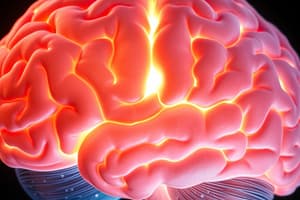Podcast
Questions and Answers
Which type of biological question investigates how behavior develops within individuals?
Which type of biological question investigates how behavior develops within individuals?
- Ontogenetic (correct)
- Physiological
- Evolutionary
- Functional
What does the concept of monism entail in biological psychology?
What does the concept of monism entail in biological psychology?
- The integration of physiological and psychological states. (correct)
- The idea that environment has no impact on behavior.
- The belief that behavior is solely influenced by genetics.
- The separation of conscious and unconscious motivations.
Which option best reflects the evolutionary explanation of behavior in biological psychology?
Which option best reflects the evolutionary explanation of behavior in biological psychology?
- Certain traits, like humans having a tailbone, indicate ancestral relations. (correct)
- Behaviors evolve rapidly and are adaptable to short-term environmental changes.
- Behavior is influenced more by personal experiences than ancestral traits.
- Behavioral capacities have remained stagnant since the advent of humans.
Why is animal research significant in biological psychology?
Why is animal research significant in biological psychology?
What primary challenge exists in studying the evolution of behavior?
What primary challenge exists in studying the evolution of behavior?
Which best describes the functional explanation in the context of biological psychology?
Which best describes the functional explanation in the context of biological psychology?
What is a crucial ethical consideration in animal research?
What is a crucial ethical consideration in animal research?
Which statement reflects a misconception about consciousness and its usefulness?
Which statement reflects a misconception about consciousness and its usefulness?
What is primarily responsible for the energy requirements of neurons?
What is primarily responsible for the energy requirements of neurons?
What role does thiamine (Vitamin B1) play in neuronal function?
What role does thiamine (Vitamin B1) play in neuronal function?
Which statement about the blood-brain barrier is accurate?
Which statement about the blood-brain barrier is accurate?
How do glial cells contribute to brain function?
How do glial cells contribute to brain function?
What does the phrase 'cells that fire together, wire together' imply?
What does the phrase 'cells that fire together, wire together' imply?
What might result from a deficiency of thiamine in relation to neuronal health?
What might result from a deficiency of thiamine in relation to neuronal health?
What does the blood-brain barrier primarily regulate?
What does the blood-brain barrier primarily regulate?
Which component of the neuron is primarily responsible for transmitting signals?
Which component of the neuron is primarily responsible for transmitting signals?
Study Notes
Brain-Mind Connection
- Brain activity directly correlates with perceptions and emotions, emphasizing its role in shaping personal identity.
- Perception is a product of the brain rather than an external phenomenon.
- Mental and brain activities are intertwined; critical assessment of behavior explanations is essential.
Types of Biological Questions
- Physiological: Studies the relationship between behavior and brain physiology.
- Ontogenetic: Investigates how individual behaviors develop over time.
- Evolutionary: Explores the historical evolution of behavioral capacities.
- Functional: Examines the purpose and adaptive significance of behaviors.
Careers in Biological Psychology
- Career opportunities include research positions, medical fields, and counseling/psychotherapy practices.
The Use of Animal Research
- Why Study Animals?: Behaviors can be more easily researched in animals due to similar biological mechanisms; ethical constraints limit human experimentation.
- Ethical Considerations: Animal research poses ethical dilemmas due to potential distress, regulated to reduce harm while enabling vital studies.
Thought Questions for Reflection
- Consciousness: Questions the usefulness and unique advantages of consciousness.
- Behavior Evolution: Discusses the challenges posed by studying behavioral evolution without fossil evidence.
Understanding Neurons and Their Role in Behavior
- Neurons are critical to understanding behavior and cognition, with learning linked to the principle “cells that fire together, wire together.”
Key Concepts
- Neuronal Anatomy: Neurons have a complex structure including the soma, dendrites, axon, and presynaptic terminals; shapes vary by function.
- Energy Requirements: Neurons utilize glucose for energy; the brain accounts for 20% of oxygen and 25% of glucose consumption despite being 2% of body weight.
- Thiamine and Neuronal Function: Vitamin B1 (thiamine) is vital for glucose metabolism; deficiencies can cause serious issues like Korsakoff’s syndrome.
- Blood-Brain Barrier: Protects the brain by allowing only specific substances to enter; glucose transport facilitated by active proteins.
Key Points to Remember
- Glial cells support neuronal function and enhance brain activity.
- Behavior arises from the interplay of neuron communication rather than isolated neuronal actions.
Key Terms
- Neurons: Cells responsible for transmitting information.
- Glia: Supportive cells in the nervous system.
- Blood-Brain Barrier: A selective barrier regulating substance entry into the brain.
- Active Transport: Movement of substances against their concentration gradient across membranes.
Thought Question
- Consider the effects of heroin and morphine; investigate how their similarities influence their interactions with the blood-brain barrier and the speed of their effects.
Studying That Suits You
Use AI to generate personalized quizzes and flashcards to suit your learning preferences.
Description
This quiz explores the intricate connection between brain activity and perceptions, as well as the development and evolution of behavior. Discover the various types of biological questions and the career opportunities available in the field of biological psychology. Additionally, learn about the significance of animal research in understanding behavioral mechanisms.




